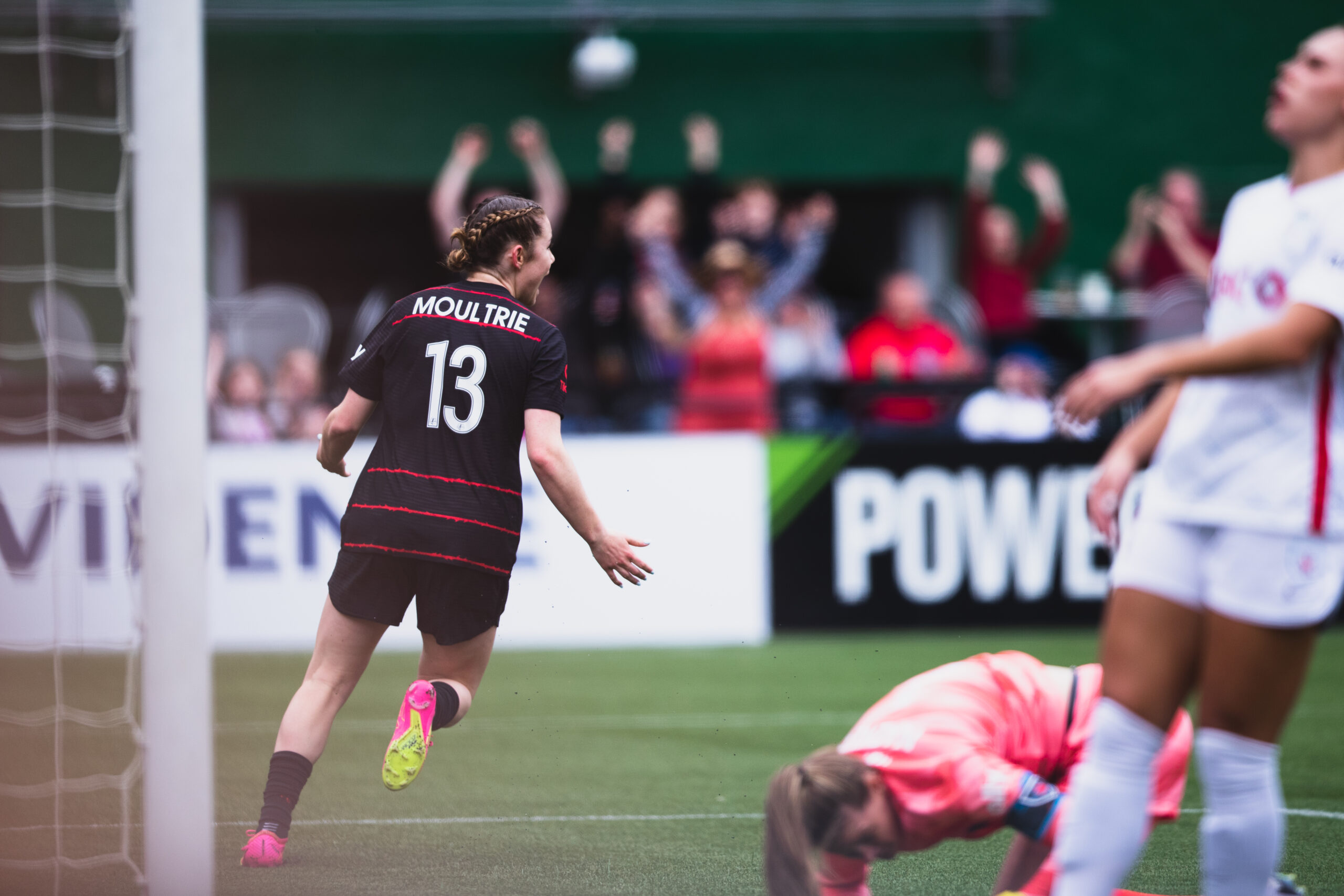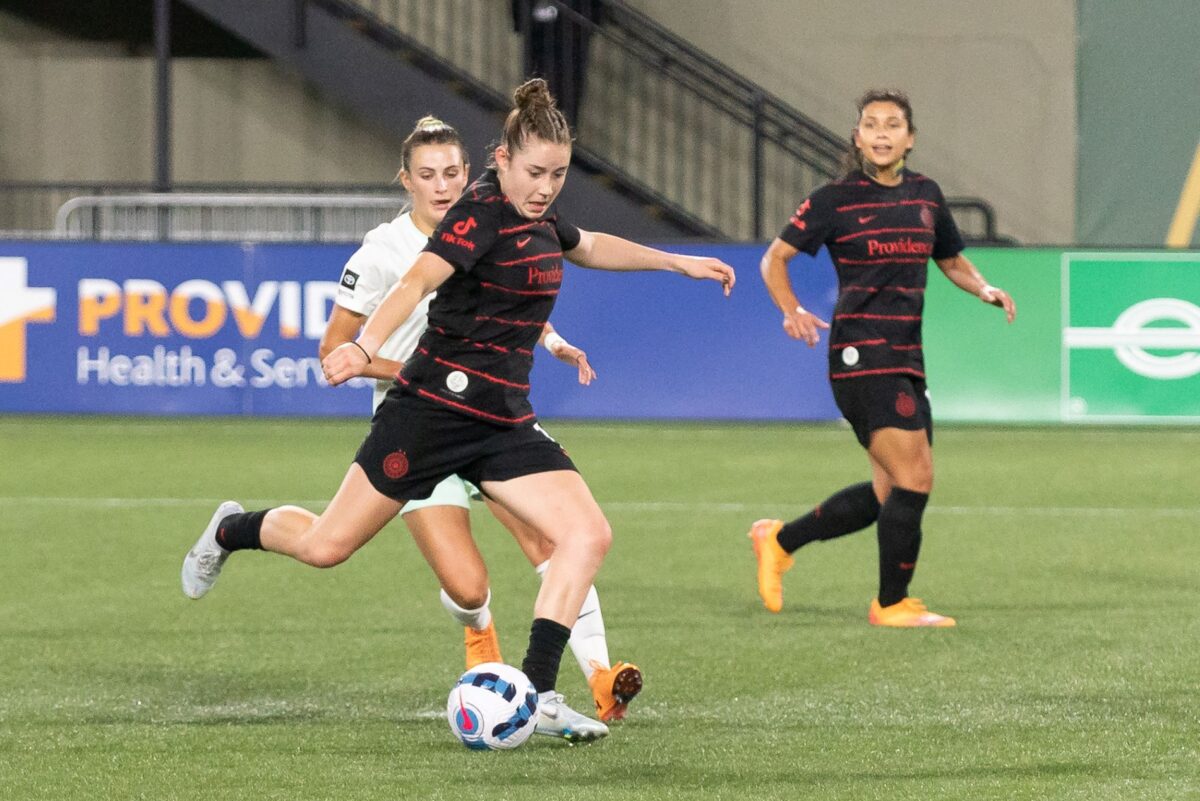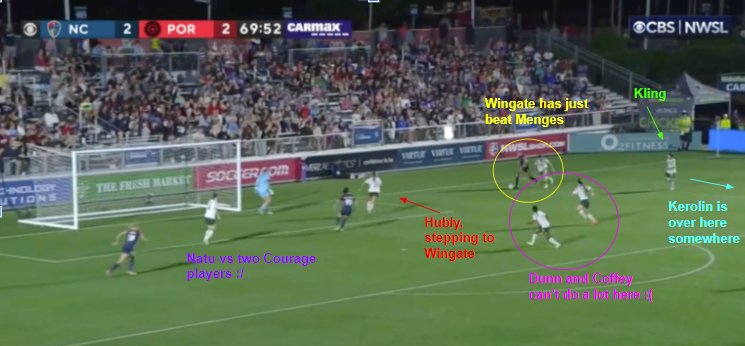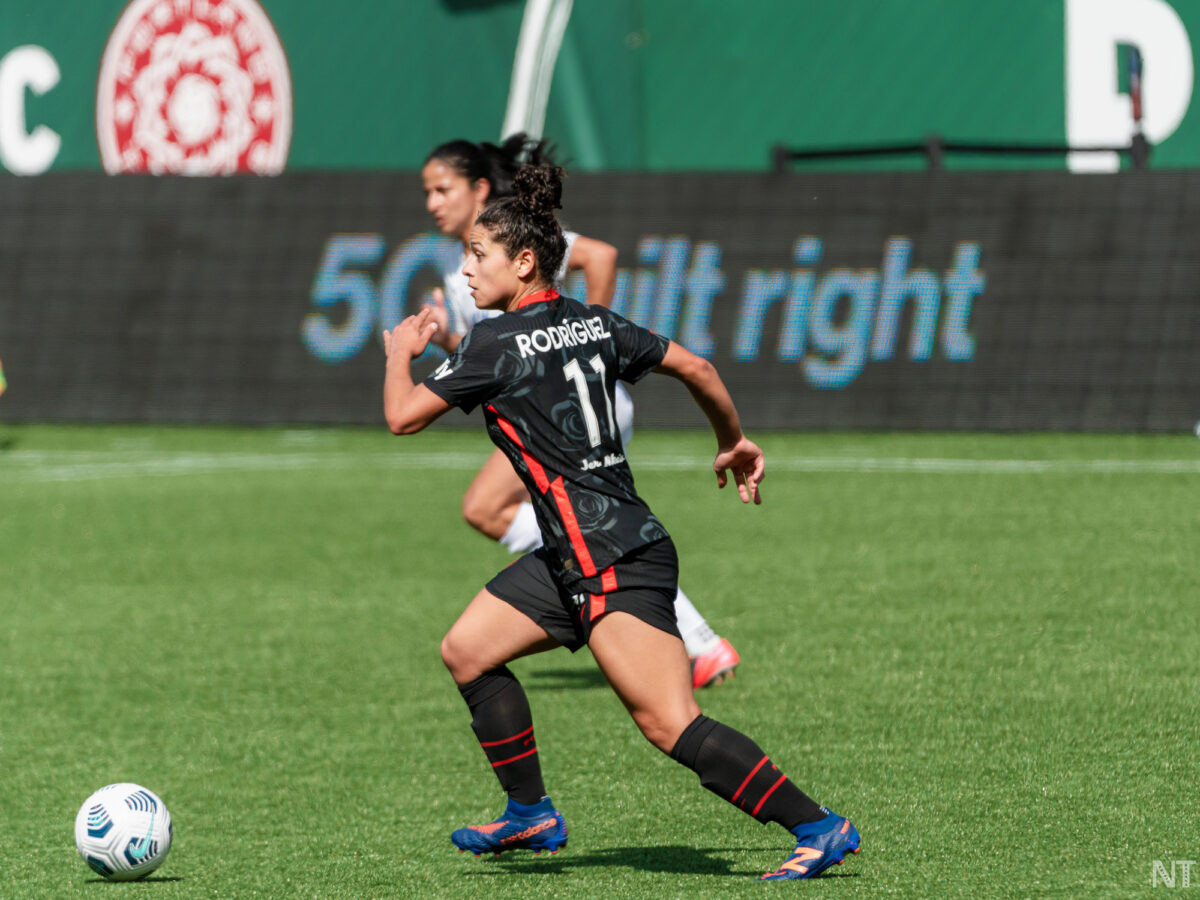To view this content, you must be a member of the Rose City Review Patreon
Already a qualifying Patreon member? Refresh to access this content.


Last Saturday, the Portland Thorns earned their second consecutive 3-3 draw, fighting back from going down a goal three separate times against the North Carolina Courage.
“I think to find ourselves down three times, it’s probably hard for to wrap me head around,” Thorns head coach Mike Norris said after the game, “but group kept pushing”—showing a resilience and rebound that Norris said he was “really proud of.”
So, let’s break all that down.
Portland was unlucky to go down in the first minute, after a North Carolina cross deflected weirdly off of Thorns defender Emily Menges. It’s the third time the Thorns have conceded off an unfortunate deflection this year—the first being a Meaghan Nally own-goal against the San Diego Wave—and I’m not really sure what to make of that happening twice in the first month and a half of 2023 play. Are the new white kits cursed? Possibly.
North Carolina’s other two goals came in the forms of a brilliant individual effort from Kerolin and Courage rookie Olivia Wingate nutmegging Menges and getting off a cross to meet Victoria Pickett’s near-post run.
“I don’t want to be a team that’s conceded three goals,” Norris said, “but I didn’t think it was a poor defensive performance. I thought it was anything but that, to be honest.”
I don’t think Norris is outright wrong—it wasn’t an awful defensive performance—but the Thorns definitely could’ve been better on North Carolina’s third goal.
In that play, the Courage are working the ball up Portland’s left flank. As we’ve alluded to above, Kerolin sends a ball ahead to Wingate, who drives endline and ‘megs Menges. Klingenberg has been drawn out to mark Kerolin, so it’s center-back Kelli Hubly who has to step to Wingate, leaving Pickett in space.

As we see above, Hubly stepping leaves Natalia Kuikka marking two Courage players (Pickett near post and Tyler Lussi far post). Dunn and Sam Coffey have been standing at the top of the box and are just beginning their runs to cover—but it’s too late.
Of the goals, this one feels the most like a situation that could’ve been avoided with a little more communication and anticipation. Even if Menges doesn’t get beat here, the Thorns are defending three-on-three, which is a situation they’d want to avoid.
(In Menges’ defense, she also wasn’t the only Thorn to get beat on a North Carolina goal; Coffey dove in too early against Kerolin on the Courage’s second goal, getting beat and leaving Kerolin with far too much space in the center of the field.)
Still, I don’t think that’s a cause for concern, yet. Even though individual players got beat on North Carolina’s second and third goals, Portland’s other defenders weren’t able to effectively drop back and cover—an issue that will hopefully resolve itself as the team gets more used to playing together. Or as Crystal Dunn put it postgame, “We’re still early enough in the season where we know that it’s just these growing pains that we’re going to go through.”
Outside of capitalizing on their chances, North Carolina, for their part, put together a pretty solid performance against the Thorns—especially in their work limiting Portland’s space in midfield. The Thorns, for their part, were forced to play wide or find quick passes through the center of the park, the latter of which they struggled to do consistently.
“We’re a team that’s at our best when we’re fluid,” Dunn said, “when we’re able to break teams down and not be stagnant.” Portland’s second goal was a prime example of that, she said.
In the buildup to the goal, we can see the Courage’s pressure—and the Thorns successfully playing out of that through quick passes. After Sophia Smith’s flick on to Meghan Klingenberg’s overlapping run, Dunn just has to push toward goal from where she’s sitting at the top of North Carolina’s box to get on the end of the cross.
Portland’s other two goals—the first from Dunn and the third from Olivia Moultrie—show another area where the Thorns found success: in their late runs out of midfield.
While we’re here, let’s take a moment to appreciate Moultrie’s game-tying goal—the cherry on top of her impressive performance off the bench.
Hey Liv, you dropped this during that unreal goal 👑#BAONPDX pic.twitter.com/fmdicfpNNG
— Portland Thorns FC (@ThornsFC) May 7, 2023
It’s still incredibly silly that, as a 17-year-old, she isn’t eligible for a player of the week nomination after that.

The Thorns earned a comfortable if unspectacular three points on the road today against Racing Louisville FC. With much of the starting lineup away with the US and Canadian national teams to prepare for the Olympics, we saw a return to a B-side Thorns lineup that we’ve gotten pretty familiar with by now.
So far we’ve always done these recaps in a list format, but I don’t feel like doing that tonight, so I’m just going to let this one ~flow~.
Something I find interesting about this iteration of the Thorns is the consistency of tactics from game to game, regardless of lineup or opponent. It’s not like they don’t adjust at all, but they’ve played the same formation since the 2020 Challenge Cup, and their defensive strategy, especially, is very consistent regardless of who’s on the field. This hasn’t always been Mark Parsons’s approach; the first few years I covered the team saw them deploy multiple shapes in each season and use pressing systems that changed depending on player availability.
What’s remarkable about this on the defensive side is that in the past, when the back line wasn’t consistent—often the case when Emily Sonnett and Ellie Carpenter were in and out of national team camps and players like Emily Menges and Meghan Klingenberg dealt with injuries—its performance suffered. But this season has already seen at least as much defensive turnover as any past Parsons season (I think it’s more, but I’m not going to dig up my 2017–2018 notebook to check, sorry), and the team has the third fewest goals allowed in the league, behind North Carolina and the ungodly lucky Gotham FC.
I’m… not sure why that is. It might be as simple as “the team has a lot of depth,” which they do. But it feels like there’s more than that—the press is so organized and effective, and the team’s quality in that area changes basically not at all, regardless of lineup.
Anyway, back to today: we did see some changes, importantly with Celeste Boureille and Marissa Everett slotting in for Lindsey Horan and Christine Sinclair. With Crystal Dunn also out, Rocky Rodríguez and Angela Salem both started, where they’ve been tagging in for each other. Those changes did make a difference offensively; there’s simply no replacing the creative genius those players provide, and the Thorns spent most of their attacking energy moving up the wings, and quite a bit of it sending in aimless crosses. On that point, though, it also has to be said that Louisville did well to stay compact centrally and force the Thorns wide. They didn’t press high, and once they dropped into their defensive block, Portland wasn’t able to break them down.

On the other hand—and this brings me back to my earlier point about the defense—Boureille did a bang-up job defensively, notching three tackles and running the length of the field, Horan-like, throughout the 90 minutes. Angela Salem, as always, was a bulldog, shutting down the handful of Louisville attacks that made their way into Portland’s defensive third, and ending the game with four chances created.
The Everett-Sinc difference is even bigger, and probably represents the biggest change in what the team is capable of going forward. Everett does the hard defensive work well, and she managed to get into the box at the right moment a number of times, but she is simply not Christine Sinclair, OC, and she’s not the same kind of link between the midfield and the forwards as the captain is.
So in short, where the full Thorns team can score any number of ways, this lineup was more or less limited to a subset of that toolbox: set pieces, balls over the top, and quick transition plays. They had a few decent looks on transition in the first half, but ultimately either lacked precision in finishing or hesitated too long and couldn’t move the ball fast enough through the final third.
But the goals came anyway, the first from a confidently shot Rocky Rodríguez penalty (after she was fouled off a corner kick), and the second when Simone Charley found the end of a sweet lofted pass by Menges (after a corner kick Kling took short), marking the defender’s first-ever Thorns assist.
The game had been all but over for a while by the time the thing this game will be remembered for happened. Fifteen-year-old Olivia Moultrie usurped Ellie Carpenter as the youngest-ever player to get minutes in an NWSL game when she subbed in for Salem after 83 minutes. And after all the noise around whether she should be allowed to sign a professional contract, the lawsuit, the media blitz, the numberless tweets—perhaps unsurprisingly, she was fine. She didn’t stand out as great, but she didn’t get bodied, either. She won the ball a couple times, lost it a couple, made some passes. Pretty standard stuff for a late-game sub, which is very impressive given her age.